Castor Oil: Key Health Benefits and How to Use It
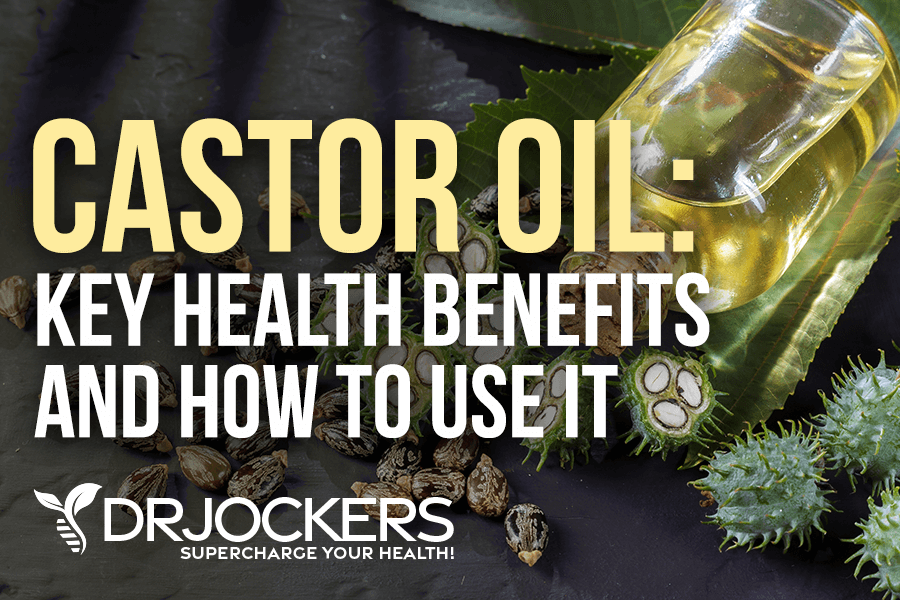 Castor Oil: Key Health Benefits and How to Use It
Castor Oil: Key Health Benefits and How to Use It
Castor oil is a fatty oil that is made from the castor seeds of the castor bean plant. Castor oil has many potential health benefits, including relieving constipation, supporting liver health, improving skin health, reducing inflammation, and more.
In this article, you will learn what castor oil is. You will learn about the health benefits, and I will discuss how to use castor oil. You will learn about the potential risks and how to pick and purchase castor oil. Finally, I will explain how to make a castor oil pack to help improve your health.
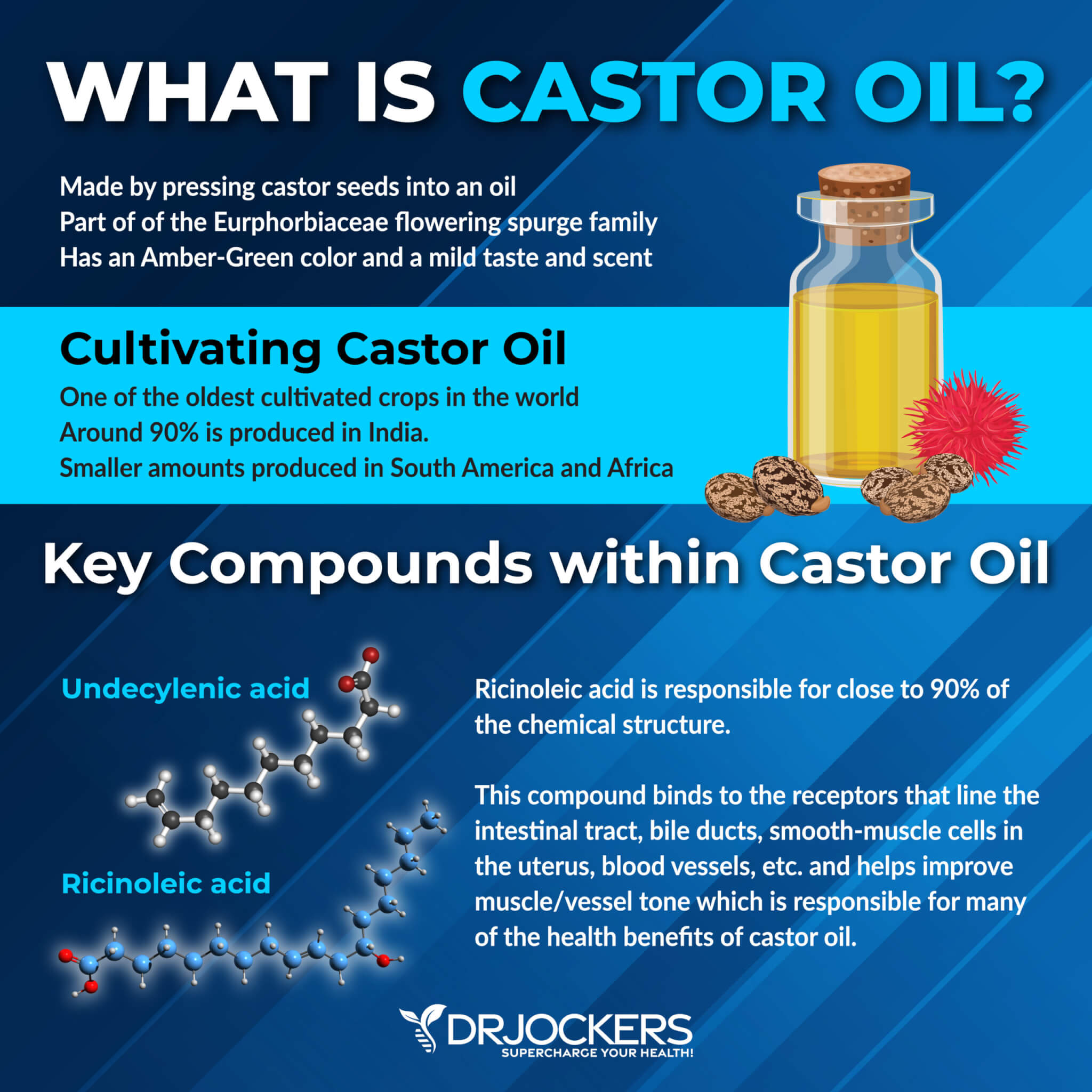
What Is Castor Oil
Castor seed oil, also known as castor oil or Ricinus Communis, is made by pressing the seeds of the plant to be used for a variety of conventional purposes. It is part of the Eurphorbiaceae plant family, which is a flowering spurge family, mostly cultivated in India, South America, and Africa. Out of these places, India is responsible for about 90 percent of the castor oil global exports.
It is also among the oldest cultivated crops in the world, making up about 0.15 percent of the world’s vegetable oils. Castor oil has an amber to green color. It has a mild scent and taste. It may be used both topically and orally as a natural remedy for various ailments. It is also used in many cosmetic products sold.
Castor oil is made up of phytochemicals, including:
- Undecylenic acid
- Ricinoleic acid
Rincinoleic acid is responsible for about 90 percent of the chemical structure of castor oil. It is a fatty acid that may be responsible for the numerous health properties castor oil is used for in natural and alternative medicine. When ricinoleic acid is released in the intestines, it may bind with receptors that line the intestinal tract and the smooth-muscle cells in the uterus, which may help to promote natural healing abilities (1).
According to a 2017 review published in the Pakistani Journal of Pharmaceutical Sciences, castor oil may have many phytochemistry, biological and pharmacological activities, offering natural medicinal benefits (2). It may offer anti-diabetic, anti-inflammatory, antimicrobial, antioxidant, liver-protective, free radical-scavenging, and wound-healing benefits.
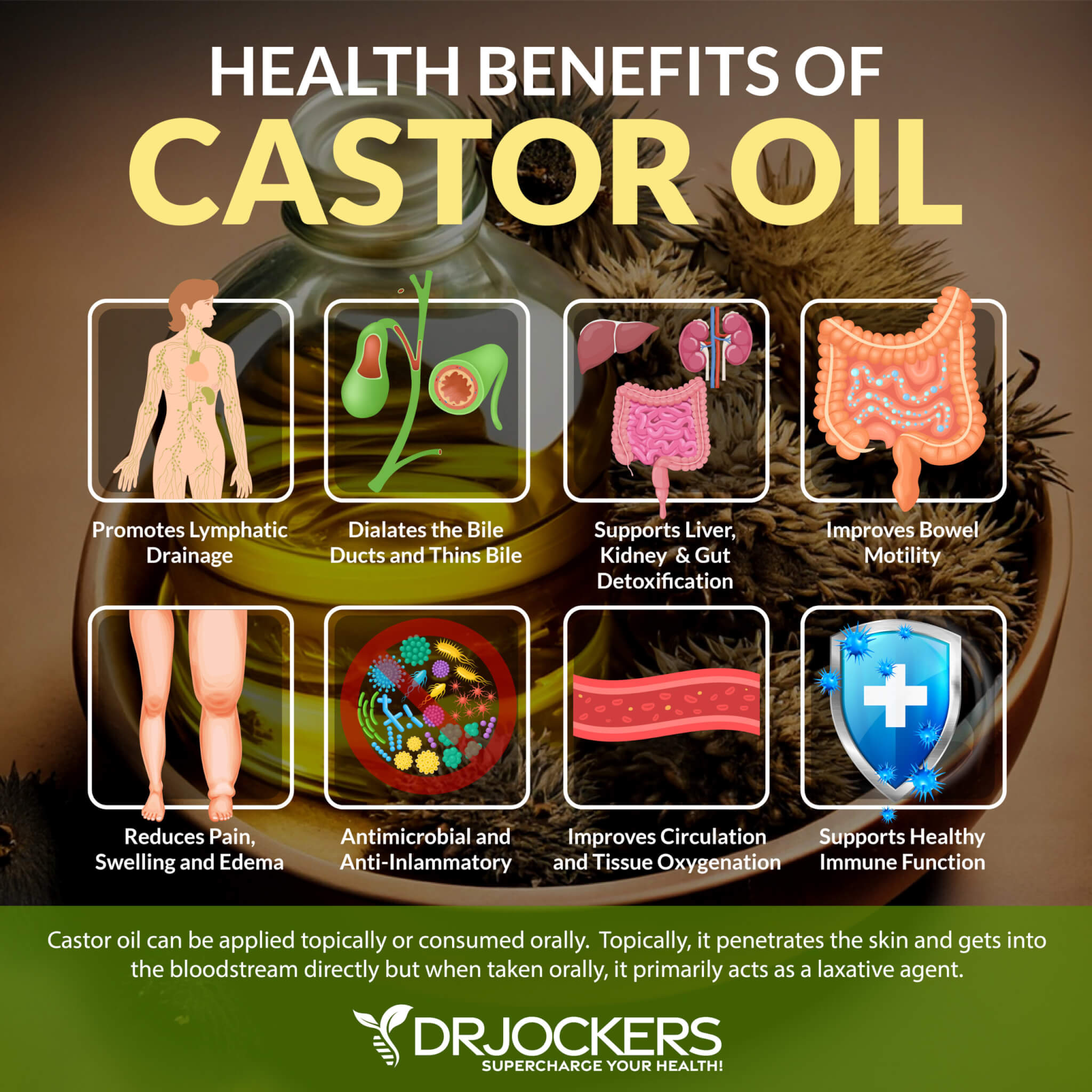
Health Benefits of Castor Oil
Castor oil has many potential health benefits. Let’s look at each of these one by one.
Promotes Lymphatic Drainage
Castor oil may help to support lymphaticdrainage and may help to remove the build-up of toxins and debris in the body. If your body is overloaded with environmental toxins, microbes, and debris, they may accumulate within the lymphatic system, which is responsible for filtering bacteria. This may cause lymphatic stagnation.
2007 research published in the International Journal of Toxicology has found that injecting rats with castor oil helped to suppress tumors that developed as the result of liver damage. (3). As castor oil gets absorbed through the skin, it may increase blood circulation, lymphatic drainage, and lymphocyte production, which may boost immune health and benefit those with a compromised immune system.

Anti-Microbial and Anti-Inflammatory
Castor oil may also offer anti-microbial and anti-inflammatory benefits. It may be a great massage oil for sore muscles, joints, and tissues. According to a 2000 study published in Mediators of Inflammation, ricinoleic acid in castor oil may offer anti-inflammatory and analgesic benefits (4).
A 2009 randomized controlled trial published in Phytotherapy Research has found that using 0.9 milliliters of castor oil capsules three times a day had similar effects for knee arthritis as 50 milligrams of diclofenac sodium (5).
Moreover, castor oil may have immune health-boosting effects by fighting microbes. According to a 2016 study published in BMC Complementary and Alternative Medicine, it may help to fight a variety of different types of bacteria, including Staphylococcus aureus, Escherichia coli, and Pseudomonas aeruginosa(6). When used internally, it may help to relieve constipation, thus elimination, and as a result, the removal of microbes and toxins in the gut.
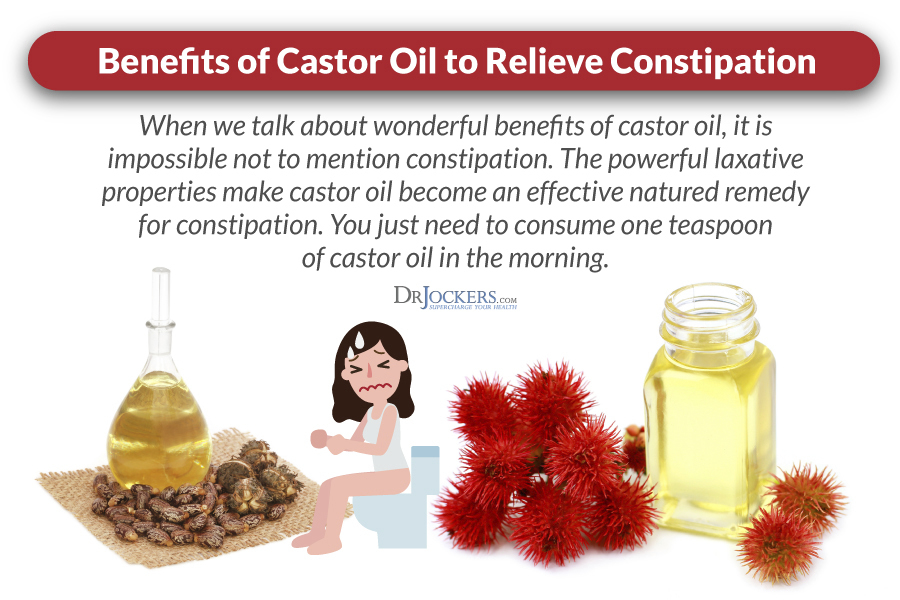
Thins Bile and Dilates the Bile Ducts
Bile is a greenish-brown liquid or digestive juice that emulsifies fats for your small intestine to absorb. It moves from your liver to the gallbladder, and then your body stores it until it needs it for the digestion of food. Bile is essential for digestion and the absorption of nutrients. Problems with bile production, bile flow, and bile acid malabsorption may lead to abdominal pain, bloating, gas, and other digestive issues.
Using castor oil packs over the abdomen and liver area may not only help liver detoxification but may also help to thin the bile, dilate bile ducts, and improve bile flow. It may also help to relieve painful spasms and cramps of the bile ducts and gallbladder.
With that said, though anecdotal and personal evidence seems to support that castor oil may benefit bile health, we need more research evidence to back this up.
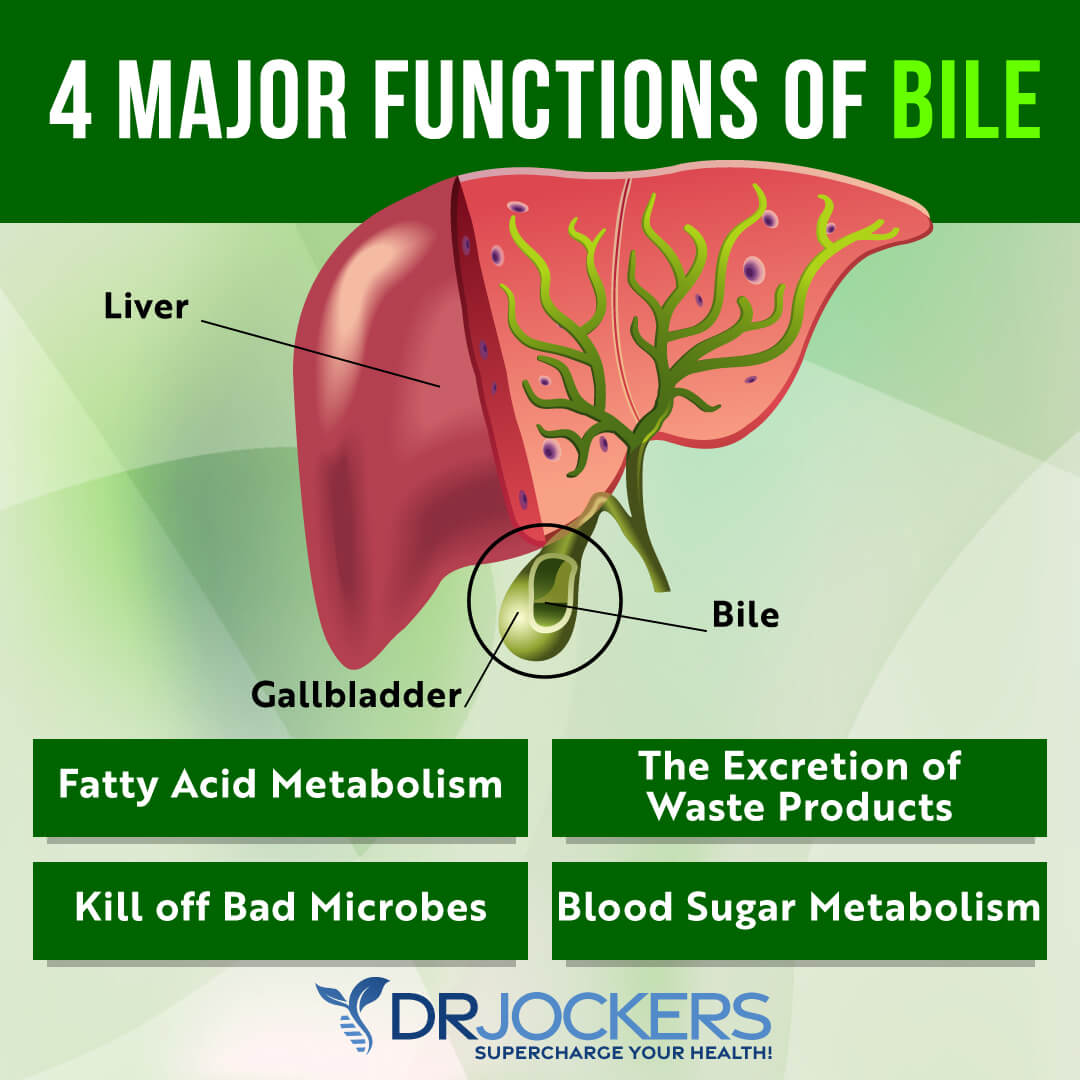
Supports Liver Detoxification
Your liver serves vital functions in the body and is critical for the process of detoxification. The liver helps circulate fluid in the body and transforms toxins into a substance which then can be dissolved, flushed down the bile ducts, relocated into the small intestine, or eliminated through stool.
Using castor oil packs over the liver area may help to support liver detoxification and liverhealth and reduce related health symptoms. According to a 2012 systematic review published in the International Journal of Naturopathic Medicine, using castor oil topically may help to support liver function and cholesterol levels (7).
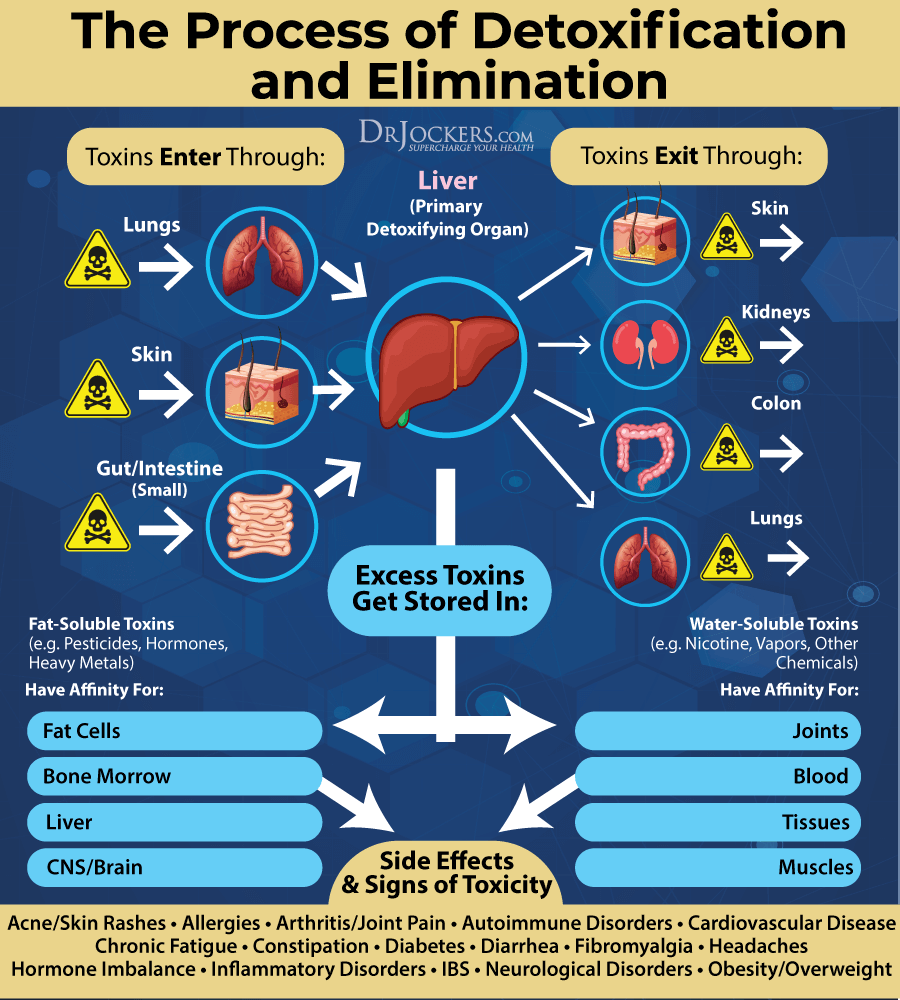
Improves Bowel Motility
Supporting digestion may be one of the main potential health benefits of castor oil. Castor oil packs may help to improve bowel motility, which means a decreased risk of constipation and fewer digestive issues. According to a 2012 systematic review published in the International Journal of Naturopathic Medicine, using castor oil topically may help to reduce constipation (7).
According to a 2011 clinical trial published in Complementary Therapies in Clinical Practice, castor oil packs may help to reduce constipation, straining during bowel movements, and the risk of incomplete bowel movements (8). According to a 2021 pilot study published in the World Journal of Gastrointestinal Pharmacology and Therapeutics, it may help to cleanse the colon before a colonoscopy (9).
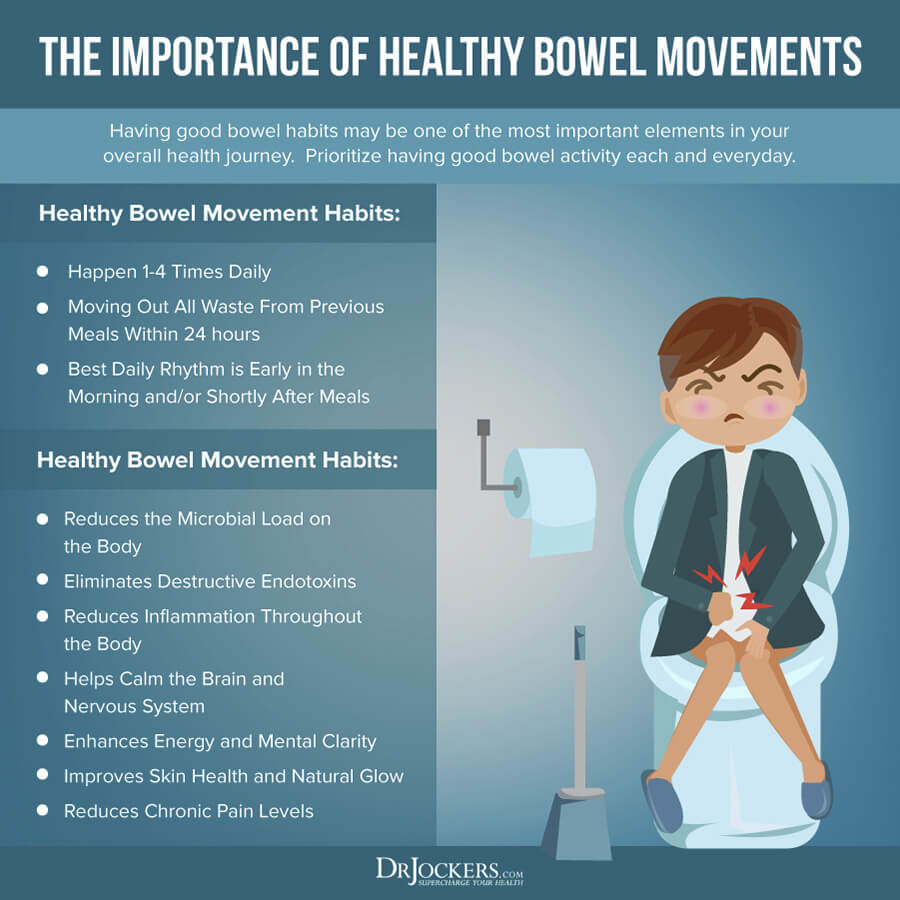
Reduces Pain, Swelling and Edema
Castor oil may also help to reduce pain, swelling, and edema. According to a 2018 study published in Polymers in Advanced Technology, castor oil may help to reduce inflammation pain and support wound healing (10). According to a 2000 study published in Mediators of Inflammation, ricinoleic acid in castor oil may offer anti-inflammatory effects, which may help to decrease pain and swelling (4).
A 2009 randomized controlled trial published in Phytotherapy Research has found that castor oil may help to reduce symptoms of knee arthritis (5). Thus, it may help to lower pain and swelling linked to this condition.
Moreover, poor circulation and poor lymphatic flow may increase swelling and edema. Because castor oil may help to support the lymphatic system and circulation, it may also reduce the risk of edema.

Improves Circulation and Tissue Oxygenation
Using castor oil may also help to improve circulation and tissue oxygenation. According to the National Heart, Lung, and Blood Institute, the lymphatic system may influence the heart, lung, brain, and other organs health (11). By supporting lymphatic circulation, castor oil may help to support the cardiovascular circulatory system and tissue oxygenation too and reduce fluid retention and edema (3).
Castor oil is also commonly used in wound healing (10). Its wound-healing effects may partly lie in supporting circulation, tissue oxygenation, and blood flow. However, we still need more research on the potential circulatory and tissue-oxygenating benefits of castor oil.
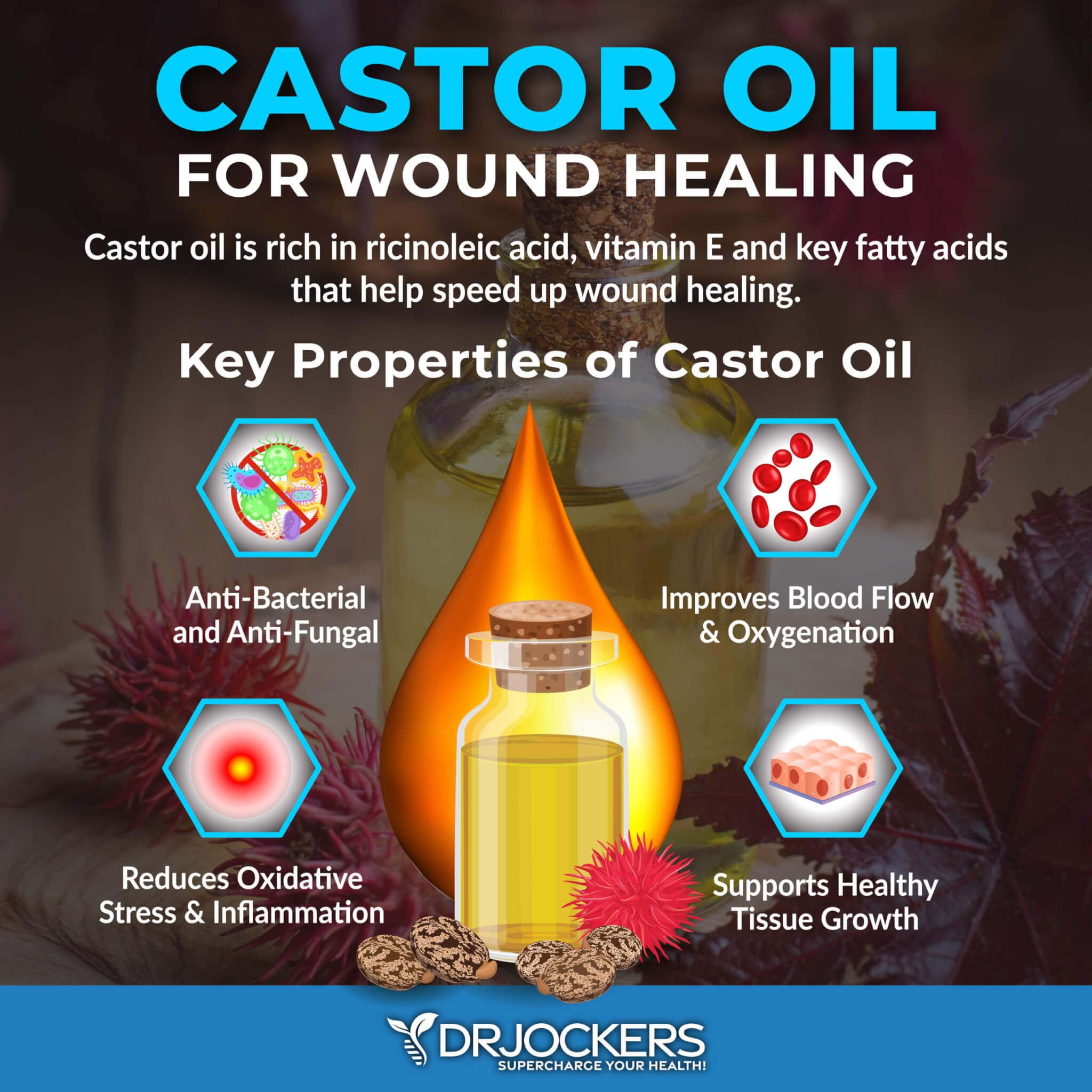
Supports Healthy Immune Function
Castor oil may support healthy immune function in a variety of ways. As we already discussed, it may help lymphatic function, which spreads across your entire body and helps to remove excess fluid, protein, and waste (11).
Castor oil may support lymphatic drainage and blood flow. It may support the production of the lymphocyte white blood cells that fight bacteria, which may assist the health of the thymus gland, which is responsible for creating T cells for the immune system.
It may also also help to fight and remove microbes from your body. According to a 2016 study published in BMC Complementary and Alternative Medicine, it may help to fight a variety of different types of bacteria, including Staphylococcus aureus, Escherichia coli, and Pseudomonas aeruginosa (6).

Moisturizes Skin
Castor oil also offers skin-protecting benefits. 100 percent pure castor oil is natural and free of synthetic chemicals. It is rich in healthy fatty acids that may boost skin health. Using it topically may help moisturize your skin, prevent water loss from the skin, reduce dry skin, and improve irritated skin.
According to 2005 research published in the Journal of Wound, Ostomy, and Continence Nursing, it may help the recovery of pressure ulcers and wound healing thanks to its moisturizing and antimicrobial benefits (12). Castor oil may also mix well with coconut oil, almond oil, and olive oil, which are also beneficial for your skin health.
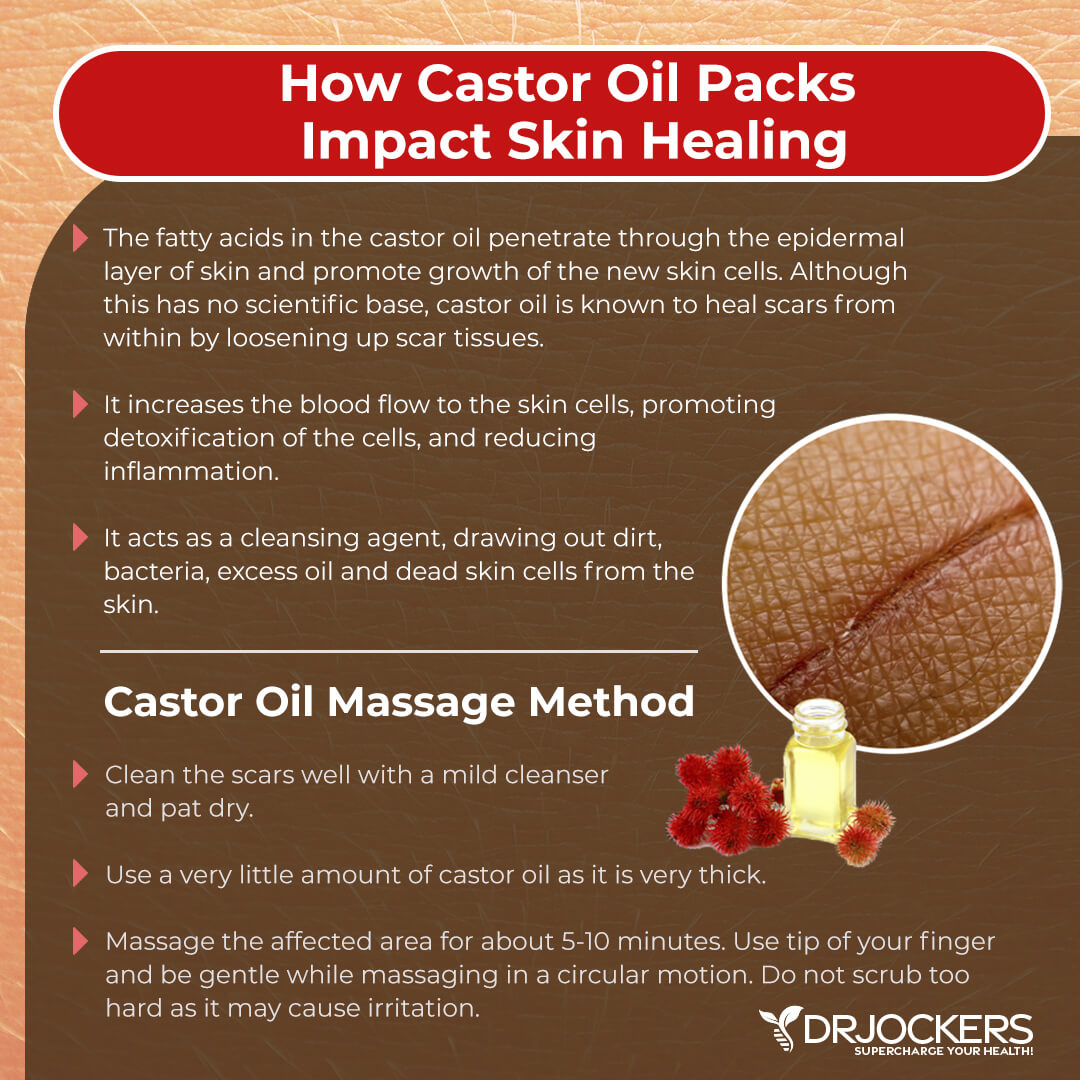
Supports Wound Healing
Moisturizing the skin is not the only skin-related potential benefit of castor oil. It has been used to improve wound healing as a natural remedy for a long time. A 2018 study published in Polymers in Advanced Technology has found that it may help to reduce inflammation pain and support wound healing (10). According to a 2005 research published in the Journal of Wound, Ostomy, and Continence Nursing, it may help wound and pressure ulcer recovery (12).
According to a 2016 study published in BMC Complementary and Alternative Medicine, it may help to fight a variety of different types of bacteria, including Staphylococcus aureus, Escherichia coli, and Pseudomonas aeruginosa(6). This may help to reduce infections of the skin, reduce the risk of a staph infection, and support wound healing.
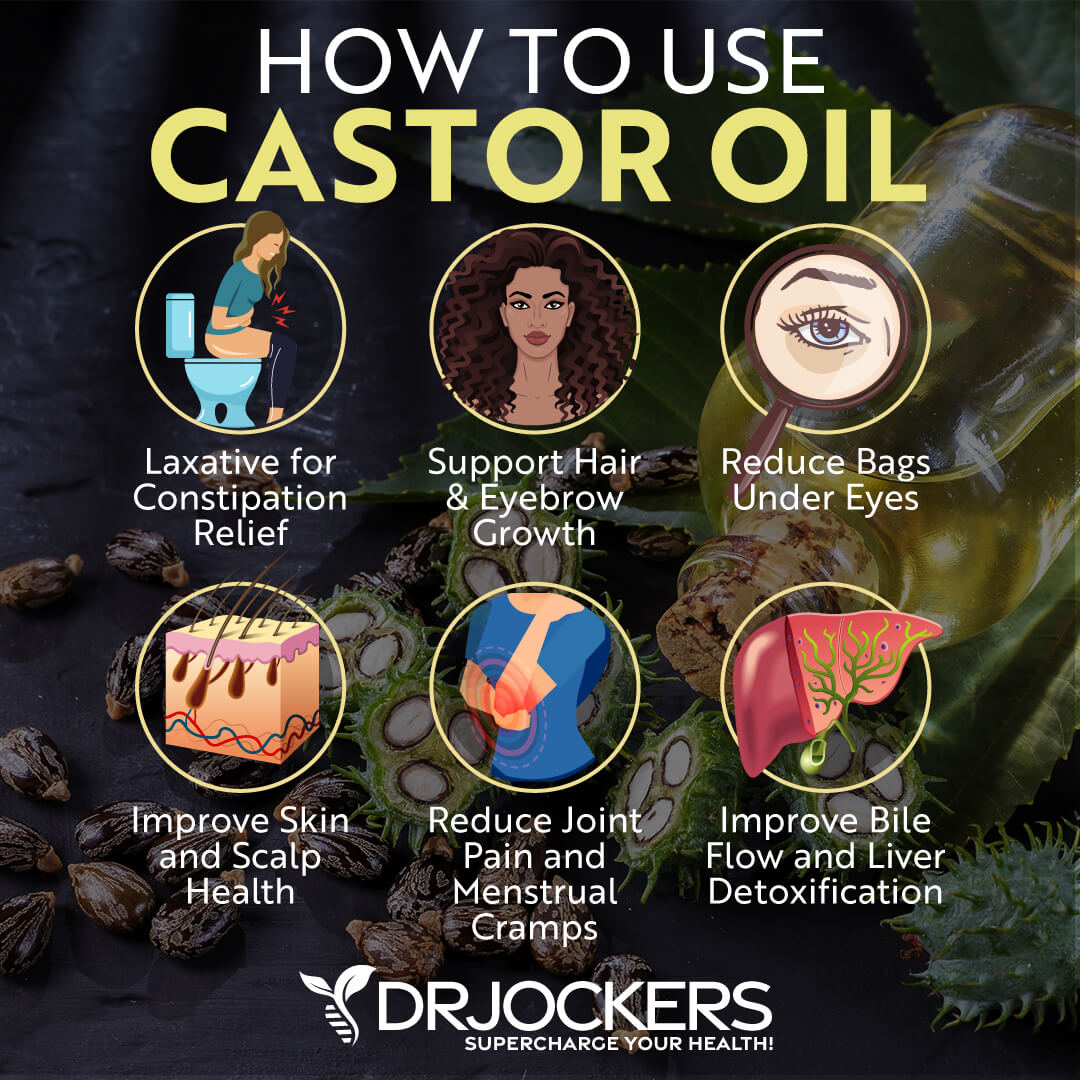
How to Use Castor Oil
If you are interested in the potential benefits of castor oil, you may wonder how to use castor oil. Here are some potential options for using castor oil, both topically and orally.
As a Laxative for Constipation Relief
You may try castor oil as a laxative for constipation relief, taken orally. The common oral dose to treat constipation is between 15 to 60 mL, as a single dose. This is between one and four tablespoons, taken once a day. For children between 2 and 12, the dose is generally 5 to 15 mL once a day, and for babies under age 2, it’s 5 mL once a day.
You may mix it in water before drinking it. Always read the directions carefully. Ideally, start on the low end of the dosage and see how your body handles it. Don’t take castor oil internally for more than seven days. And always consult your healthcare practitioner before using it orally. Stop using it if you experience any side effects.
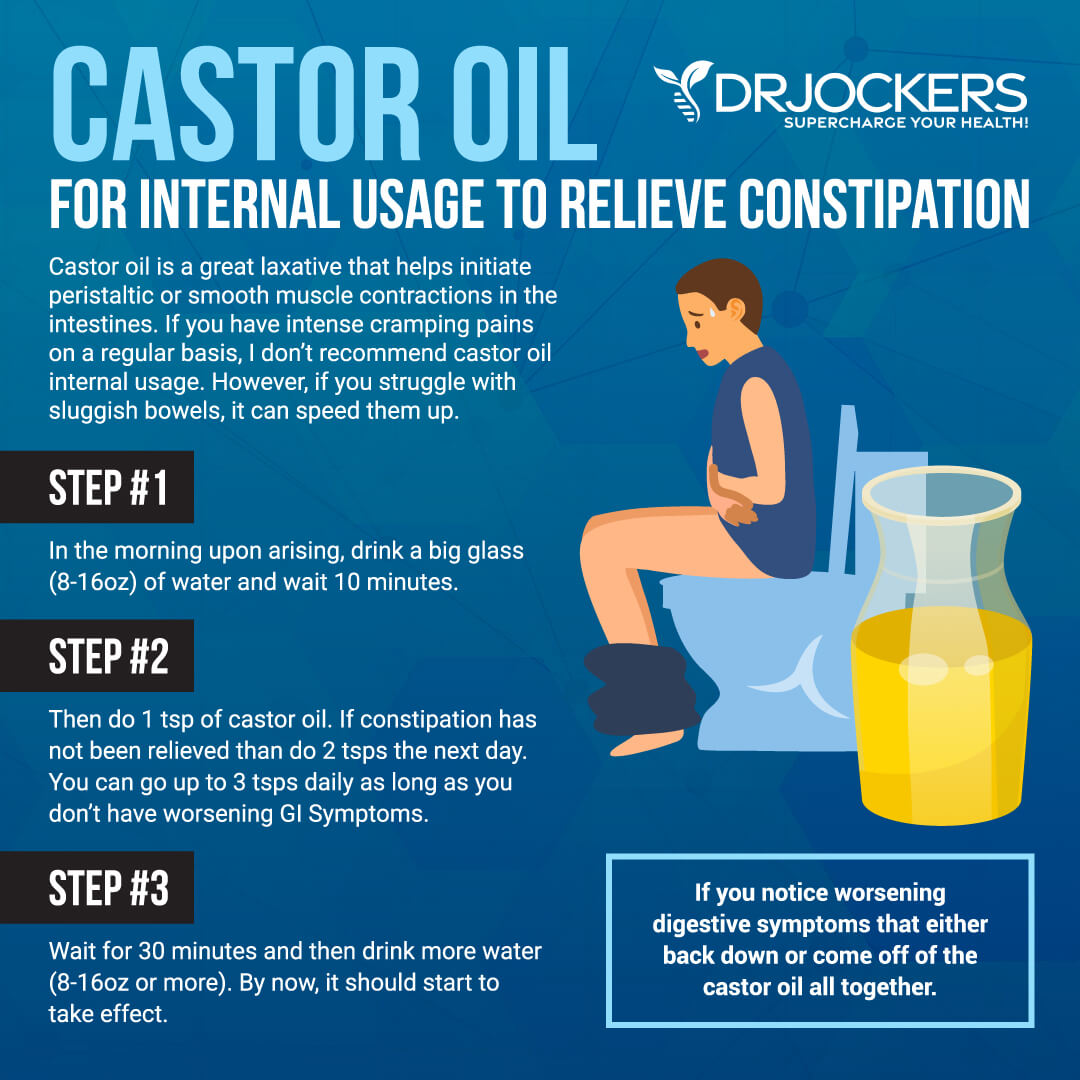
Support Hair and Eyebrow Growth
Castor oil may support hair growth and eyebrow growth. For hair growth, you may massage a few tablespoons of castor oil into your scalp and hair, then spread it all over your hair. You may leave it on overnight and wash it out in the morning.
For your eyebrows, use a cotton swab or a clean mascara and apply a small amount of castor oil over your clean brows for about 20 minutes or longer. You may even apply it before sleep and sleep in it. Clean it with the help of a cotton swab and be careful it doesn’t get into your eyes.
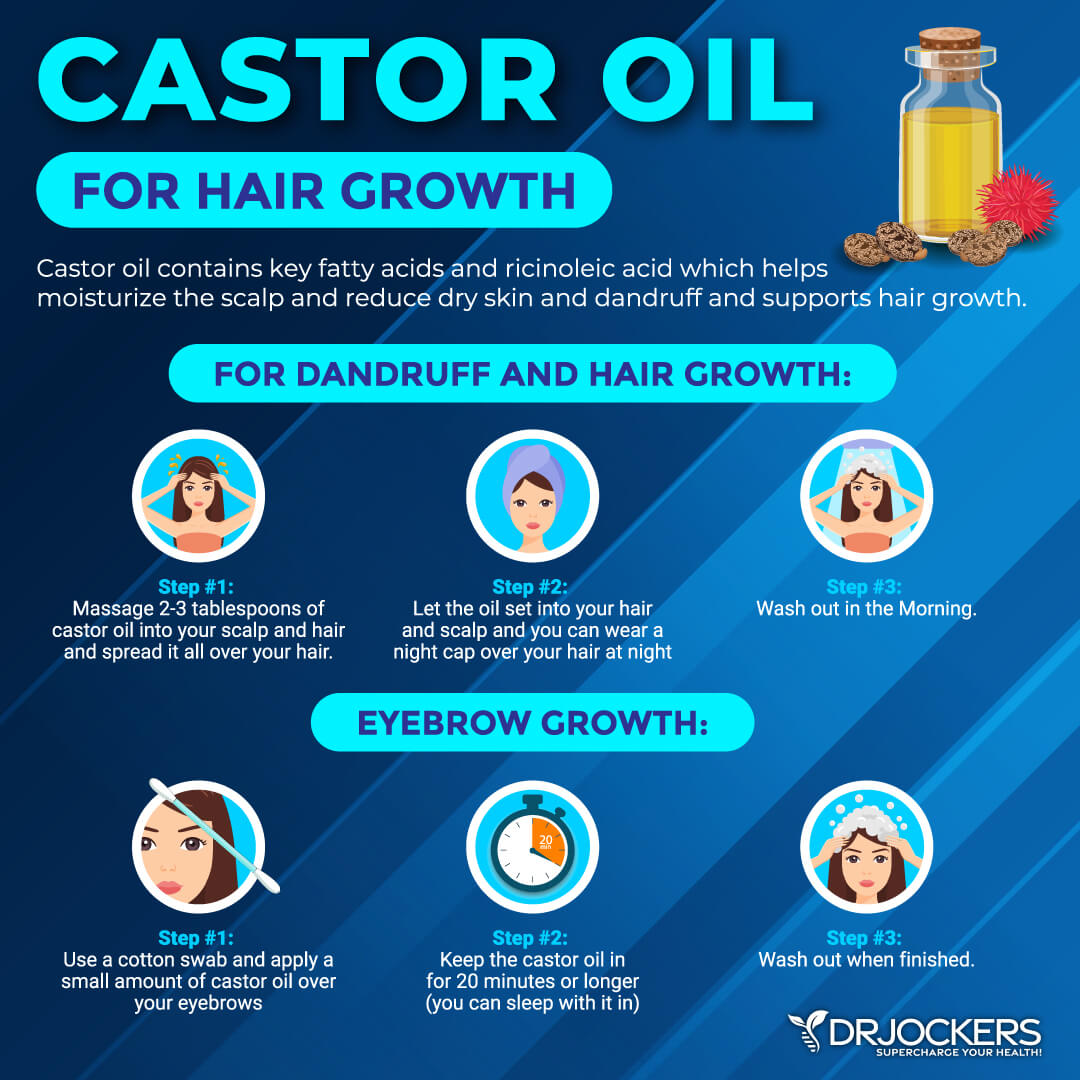
Reduce Bags Under Eyes
Castor oil may help to reduce under-eye bags, dark circles, and hyperpigmentation. First, wash your face. Then massage 3 to 4 drops of the oil under your eyes. You may try a carrier oil, such as jojoba, almond, or coconut oil, to dilute it.
Using your fingertips for massaging works just fine, but you may also use a jade roller. You may leave it on overnight and clean it in the morning gently. Be careful that it doesn’t get into your eyes.
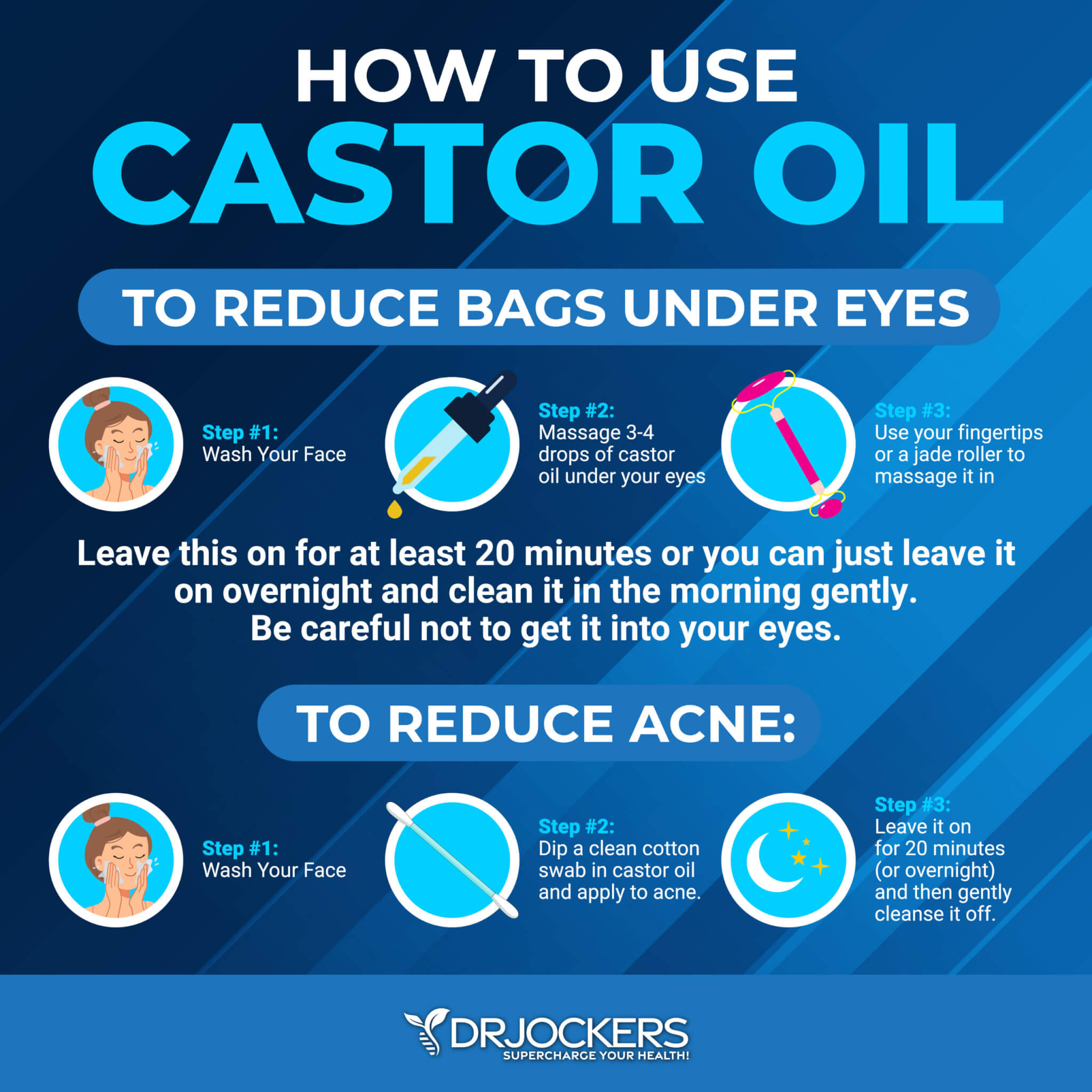
Improve Skin Health and Dandruff
Castor oil may offer numerous skin health benefits. For acne, you may apply the oil with a clean cotton swab. You may also mix it with apple cider vinegar, frankincense essential oil, or other essential oils to reduce swelling, inflammation, pain, and scarring. To reduce breakout, you can massage some of the oil into your skin and leave it on for the night, then cleanse it off in the morning.
For hydration, mix ¼ cup of castor oil and ¾ cup of virgin coconut or olive oil, and apply it on your face or elsewhere on your body. For moisturizing, mix ¼ cup of castor oil with olive oil, coconut oil or jojoba oil. Massage it on your skin, leave it on overnight, then rinse. You may mix one teaspoon of castor oil with one egg yolk for a 10 to 20-minute face mask.
For sunburns, mix coconut oil and castor oil at a 1 to 1 ratio and apply it on the affected area to reduce inflammation, redness, and pain. For dandruff and scalp issues, massage castor oil into your scalp and leave it on overnight.
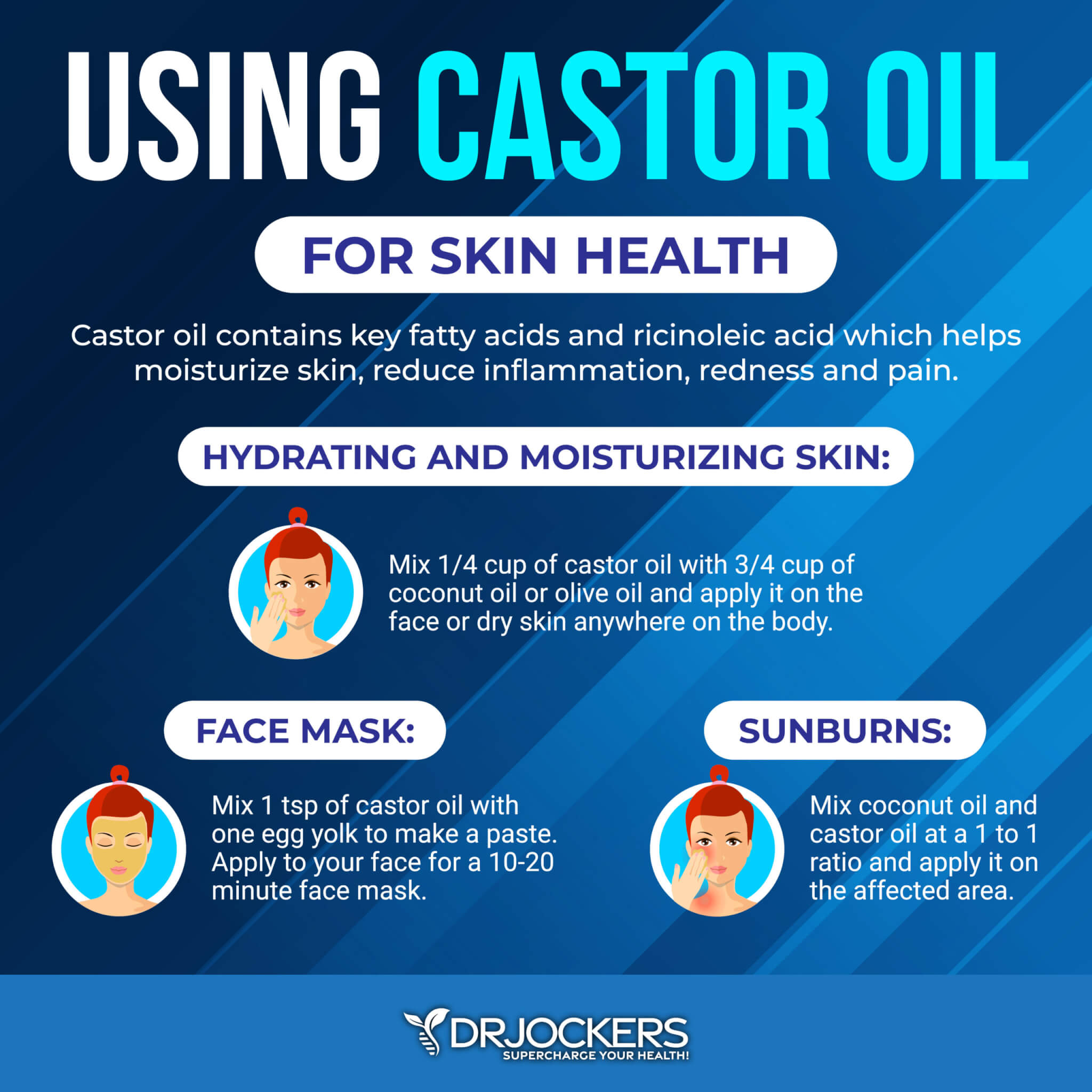
Reduce Joint or Menstrual Pain
To reduce joint pain, you may massage castor oil into your skin on the affected area as you would with any other pain-relieving cream. About a dime-sized amount, every 3 hours or so may be helpful. Try it for three days for symptom relief.
For menstrual cramps, you may either massage it on your lower abdomen area or use a castor oil pack. At the end of this article, you will learn about how to make and use a castor oil pack.
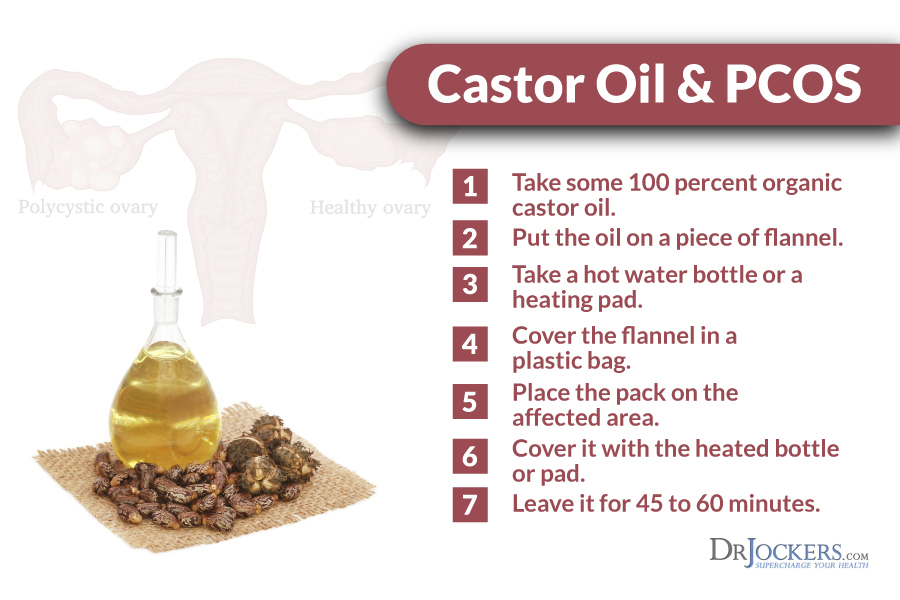
Improve Bile Flow and Liver Detoxification
We know that healthy bile flow is key for eliminating toxins from the liver, digesting and absorbing fats and fat-soluble nutrients and improving the microbial balance in the gut microbiome.
Castor oil is great for improving bile flow, liver detoxification, and liver function. For this, I recommend using a castor oil pack, which I will explain in more detail at the end of this article.

Contraindications to Using Castor Oil
Castrol oil is generally recognized as safe. It can also be found in high concentrations in some cosmetics, including lipstick. However, according to 2007 research published in the International Journal of Toxicology, there may be some toxic effects when consumed orally, thus using it orally may not be recommended (3).
There are currently not enough studies and clinical trials on the benefits and safety of castor oil, thus many doctors are unaware of the potential health benefits and physiological effects. Limited studies and tales of midwifery, including a 2012 report published in PNAS,have reported symptoms of nausea, cramps, and loss of fluid and electrolytes when ingesting the oil (13).
If you ingest castor oil, it gets broken down by your small intestine into ricinoleic acid. Ricinoleic acid acts as an irritant, which may help to relieve constipation. While this may be good news if you have constipation, this same effect may cause digestive discomfort, diarrhea, and other gastrointestinal side effects in others.
However, if you have constipation, it may be beneficial, generally by starting with 1 teaspoon in the morning and seeing if you get the relief you need. If not, you can try 2 teaspoons the following morning. This is generally safe. If you notice any pain, discomfort, or side effects, back off.
Sometimes castor oil is also used by some midwives to help induce labor. However, it is important that you don’t try this at home by yourself, only by the recommendation and with the support of your midwife or healthcare professional.
However, castor oil is not for everyone. People who should avoid it may include:
- Women who are Pregnant: As I mentioned, sometimes castor oil is actually used to induce labor, and limited research evidence backs this up. This may happen because ricinoleic acid contained in the oil may signal a response from the lining of the uterus. Therefore, castor oil is not recommended for women who are pregnant unless recommended by a doctor to stimulate labor (13).
- Women Experiencing Heavy Menstrual Flow: Women experiencing heavy menstrual bleeding should also avoid the use of castor oil packs during menstruation. Otherwise, these packs may possibly help to ease cramping and regulate a woman’s menstrual cycle.
- Individuals with Gastrointestinal Problems: The ricinoleic acid has been found to interact with the lining of the gastrointestinal tract and can worsen gastrointestinal conditions and increase symptoms or the risk of complications. Individuals experiencing ulcers, diverticulitis, hemorrhoids, and colitis should avoid castor oil packs unless otherwise recommended by a doctor. Other more minor and general gastrointestinal issues such as gas, bloating, cramping, and constipation, generally respond very well to the use of castor oil packs and may be beneficial.
- Individuals with Extreme Skin Sensitivities: Castor oil packs should also not be used by anyone who has any chronic skin conditions with increased skin sensitivities. Individuals with these issues may be at an increased risk of developing a reaction from the topical application of castor oil packs (3).
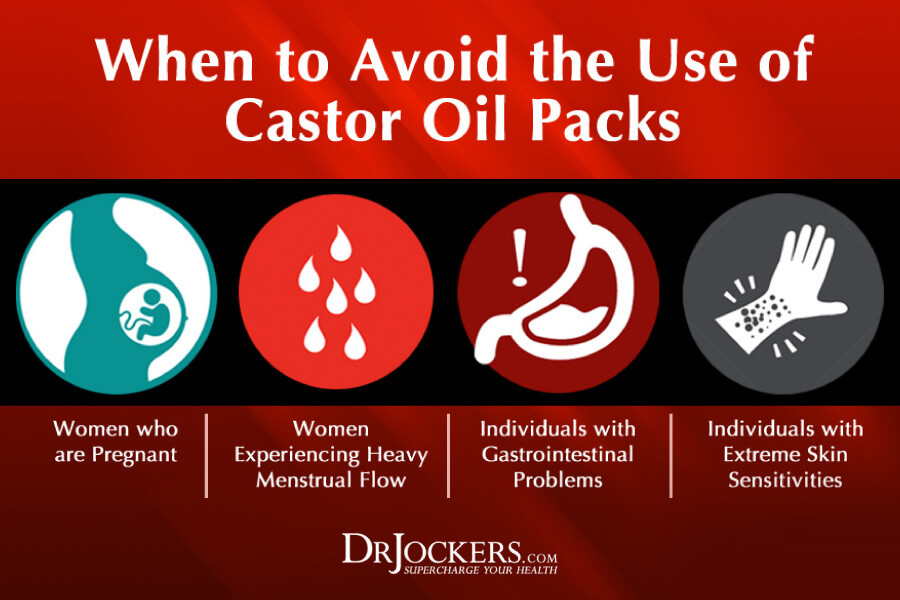
How to Purchase Castor Oil
Whether you are looking to buy only castor oil itself or an entire kit for a castor oil pack, you need to look for a high-quality product. I highly recommend and personally use Queen of Thrones castor oil. Dr. Marisol is an expert in castor oil therapy, and she has made it much easier to use this oil with her high-quality products.
Queen of Thrones offers quality castor oil products, including organic castor oil in a glass jar, which is what I personally use at home. Getting organic castor oil in a glass jar is important because if there is any pesticide residue contained in the oil or plastic residue (phthalates) from the bottle, it can be absorbed through the skin.
Using high-quality products, like Queen of Thrones may help to prevent this. Use the coupon code DRJOCKERS10 at checkout with Queen of Thrones to save 10%.
How to Make a Castor Oil Pack
So, how do you make your own castor oil pack? Start by getting some Queen of Thrones, then follow these instructions:
- Before applying a castor oil pack to the skin’s surface, test for skin sensitivity. Rub a small amount of the oil directly onto a limited area of skin to determine if a reaction develops.
- Avoid using electric heat pads without an automatic shut-off following a period of time. According to testimonials, some people had issues falling asleep with ease during castor oil pack treatments. If you choose to get the pieces separately (as opposed to the Queen of Thrones castor oil pack), then here are instructions on how to do them correctly:
- Choose a place where you can lie down comfortably. Cover it with an old towel to avoid damage from dripping oil.
- Use a large enough flannel that’s enough to cover the area you use it on.
- Saturate the flannel with enough oil to make it wet but not dripping.
- Lie down and cover your entire abdomen area with flannel or the specific area, for example, your liver area, you are using it on.
- Cover the flannel with some plastic.
- Put some heating source on top, such as a heating pad, hot water bottle, or hot towel.
- Relax for 45 minutes to 2 hours with the castor oil pack there. Using this time for meditation or breathwork is a great idea, but you may listen to music, read, or watch your favorite show.
- When finished, wash it off with soapy water or a solution of 2 tablespoons of baking soda in a quart of water.
- You can store your pack in the fridge and reuse it later. It’s safe to use until you see a visible change in color.
- Repeat this process at least three times per week for a month for optimal results or as recommended by your health practitioner.
You will see that it can be a lot of work, and that is why I believe the Queen of Thronespack makes it much easier to do as it provides the flannel with ties on it, so you don’t need to wrap yourself in plastic! Use the coupon code DRJOCKERS10 at checkout with Queen of Thrones to save 10%.
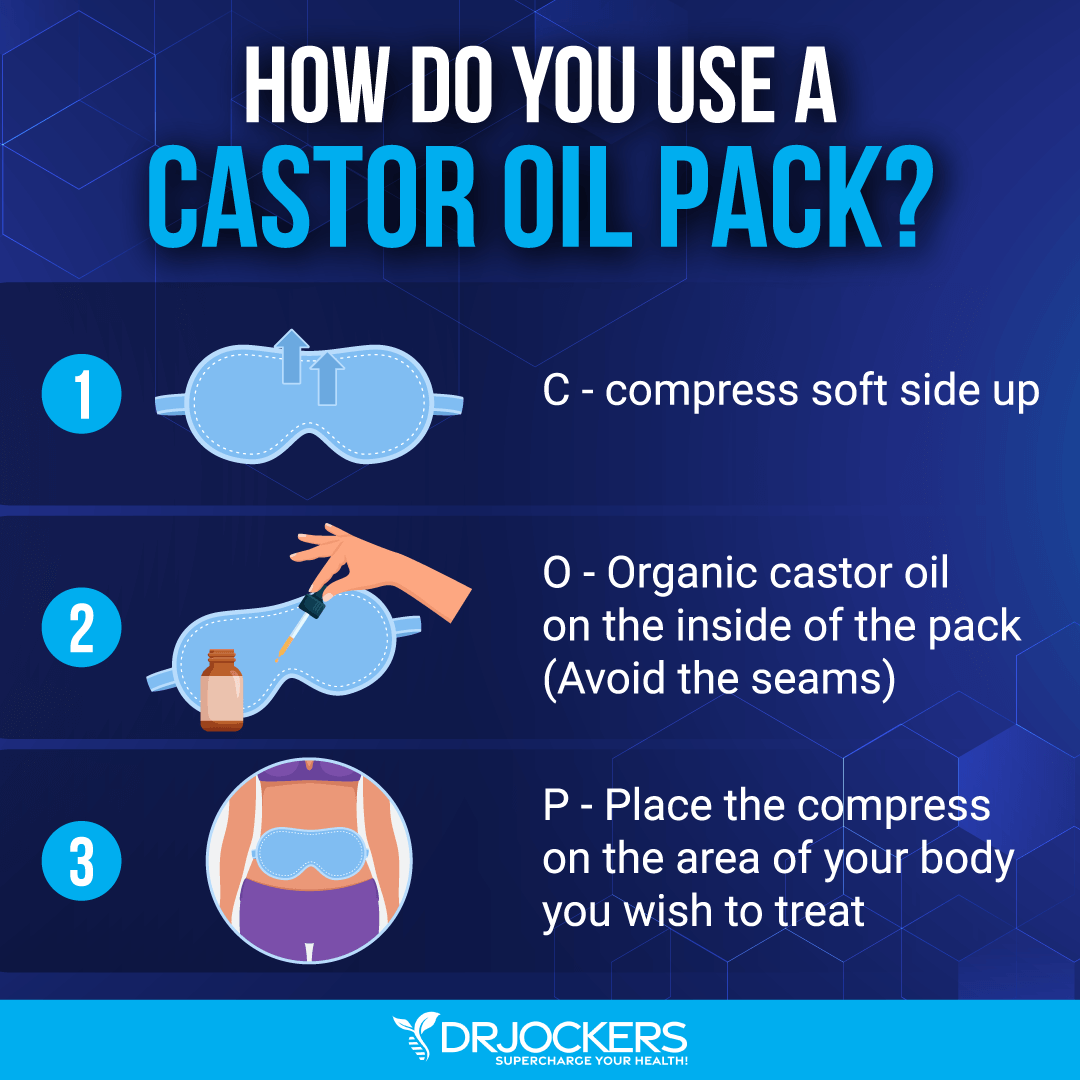
Final Thoughts
Castor oil is a fatty oil that is made from the castor seeds of the castor bean plant. It has many potential health benefits, including relieving constipation, supporting live health, improving skin health, reducing inflammation, and more. I recommend that you follow my tips in this article on how to use this great natural product for your health.
If you want to work with a functional health coach, I recommend this article with tips on how to find a great coach. Our website offers long-distance functional health coaching programs. For further support with your health goals, just reach out and our fantastic coaches are here to support your journey.
Inflammation Crushing Ebundle
The Inflammation Crushing Ebundle is designed to help you improve your brain, liver, immune system and discover the healing strategies, foods and recipes to burn fat, reduce inflammation and Thrive in Life!
As a doctor of natural medicine, I have spent the past 20 years studying the best healing strategies and worked with hundreds of coaching clients, helping them overcome chronic health conditions and optimize their overall health.
In our Inflammation Crushing Ebundle, I have put together my very best strategies to reduce inflammation and optimize your healing potential. Take a look at what you will get inside these valuable guides below!
Sources In This Article Include:
1. Tunaru S, et al. Castor_oil induces laxation and uterus contraction via ricinoleic acid activating prostaglandin EP3 receptors. PNAS 2012;109(23):9179-9184. DOI: 1073/pnas.1201627109
2. Marwat SK, Rehman F, Khan EA, Baloch MS, Sadiq M, Ullah I, Javaria S, Shaheen S. Review – Ricinus cmmunis – Ethnomedicinal uses and pharmacological activities. Pak J Pharm Sci. 2017 Sep;30(5):1815-1827. PMID: 29084706
3. Final Report on the Safety Assessment of Ricinus Communis (Castor) Seed Oil, Hydrogenated Castor Oil, Glyceryl Ricinoleate, Glyceryl Ricinoleate SE, Ricinoleic Acid, Potassium Ricinoleate, Sodium Ricinoleate, Zinc Ricinoleate, Cetyl Ricinoleate, Ethyl Ricinoleate, Glycol Ricinoleate, Isopropyl Ricinoleate, Methyl Ricinoleate, and Octyldodecyl Ricinoleate. International Journal of Toxiciology. May 2007;26:31-77. DOI: 1080/10915810701663150
4. Vieira C, Evangelista S, Cirillo R, Lippi A, Maggi CA, Manzini S. Effect of ricinoleic acid in acute and subchronic experimental models of inflammation. Mediators Inflamm. 2000;9(5):223-8. doi: 10.1080/09629350020025737. PMID: 11200362
5. Medhi B, Kishore K, Singh U, Seth SD. Comparative clinical trial of castor_oil and diclofenac sodium in patients with osteoarthritis. Phytother Res. 2009 Oct;23(10):1469-73. doi: 10.1002/ptr.2804. PMID: 1928853
6. Al-Mamun MA, Akter Z, Uddin MJ, Ferdaus KM, Hoque KM, Ferdousi Z, Reza MA. Characterization and evaluation of antibacterial and antiproliferative activities of crude protein extracts isolated from the seed of Ricinus communis in Bangladesh. BMC Complement Altern Med. 2016 Jul 12;16:211. doi: 10.1186/s12906-016-1185-y. PMID: 27405609
7. Evidence for the Topical Application of Castor_Oil.International Journal of Naturopathic Medicine 2012. Link Here
8. Arslan GG, Eşer I. An examination of the effect of castor_oil packs on constipation in the elderly. Complement Ther Clin Pract. 2011 Feb;17(1):58-62. doi: 10.1016/j.ctcp.2010.04.004. Epub 2010 May 18. PMID: 21168117
9. Takashima K, Komeda Y, Sakurai T, Masaki S, Nagai T, Matsui S, Hagiwara S, Takenaka M, Nishida N, Kashida H, Nakaji K, Watanabe T, Kudo M. Castor_oil as booster for colon capsule endoscopy preparation reduction: A prospective pilot study and patient questionnaire. World J Gastrointest Pharmacol Ther. 2021 Jul 5;12(4):79-89. doi: 10.4292/wjgpt.v12.i4.79. PMID: 34316385
10. Nada AA, Arul MR, Ramos DM, Kroneková Z, Mosnáček J, Rudraiah S, Kumbar SG. Bioactive polymeric formulations for wound healing. Polym Adv Technol. 2018 Jun;29(6):1815-1825. doi: 10.1002/pat.4288. Epub 2018 Mar 27. PMID: 30923437
11. Scientists Seek to Understand Lymphatic System’s Impact on Other Organ SystemsLink Here
12. Narayanan S, Van Vleet J, Strunk B, Ross RN, Gray M. Comparison of pressure ulcer treatments in long-term care facilities: clinical outcomes and impact on cost. J Wound Ostomy Continence Nurs. 2005 May-Jun;32(3):163-70. doi: 10.1097/00152192-200505000-00004. PMID: 15931146
13. Tunaru S, et al. Castor oil induces laxation and uterus contraction via ricinoleic acid activating prostaglandin EP3 receptors. PNAS 2012;109(23):9179-9184. DOI: 1073/pnas.120162710
Was this article helpful?
YesNo

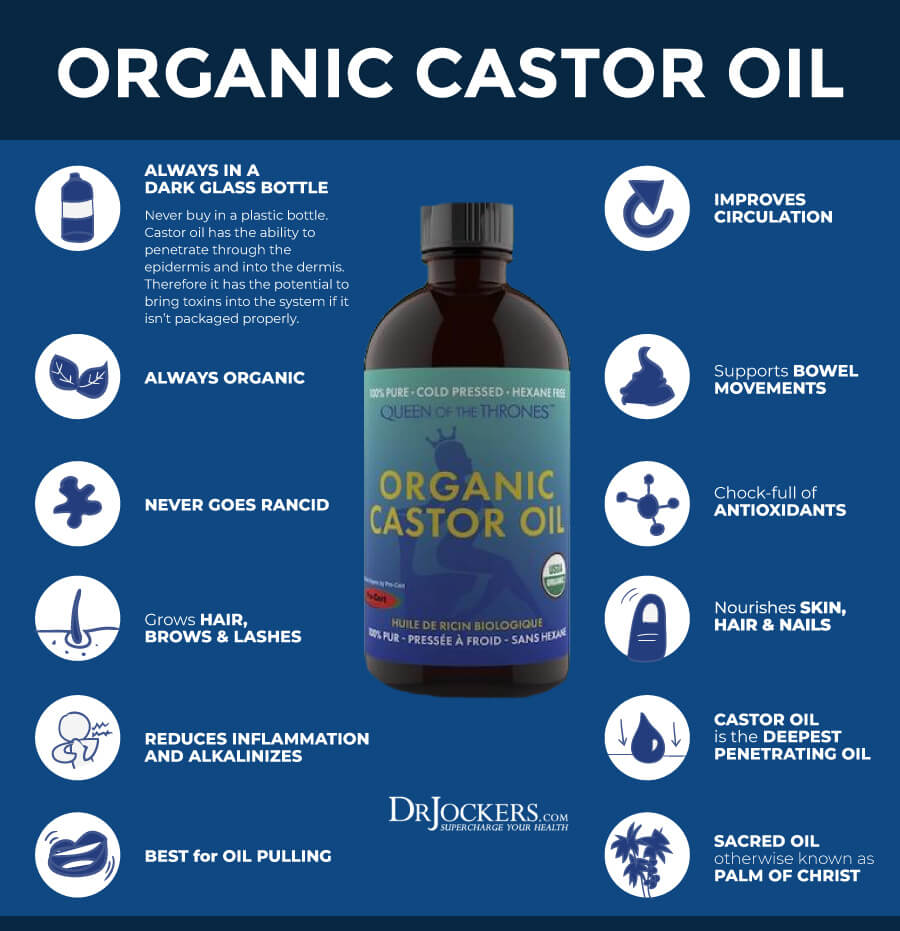



No comments:
Post a Comment